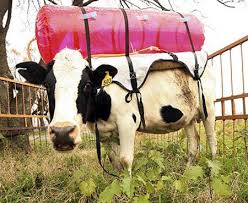 Why a Fertilizer Crisis May (Thankfully) Make Farmers Ditch the Chemicals for Old-Fashioned Poop
Why a Fertilizer Crisis May (Thankfully) Make Farmers Ditch the Chemicals for Old-Fashioned PoopPeople talk about Peak Oil, but we're also at Peak Fertilizer. Without plenty of some kind of fertilizer, there will not be enough food to go around.
I never thought I'd see the day when shit -- the bodily kind -- would make headlines the way it is right now.
When my book about managing manure, Holy Shit, came out recently, erstwhile friends grinned and remarked, "You've been shooting the bull all your life so, sure, why not write a book about it?"
But this time what I'm writing is definitely not B.S. The current fertilizer crisis is real. Chemical fertilizer prices rise and fall with every change of pulse in supply and demand, but they are definitely on a long-term rise -- not only because production and transportation costs are increasing, but because of anticipated shorter supplies in the future. People talk about Peak Oil, but we're also at Peak Fertilizer. Without plenty of some kind of fertilizer, there will not be enough food to go around. The headline hype is not just overreaction from the press: recently farming news sources such as DTN were reporting all over their networks about how international traders in phosphorous and potash are elbowing for bigger chunks of the remaining fertilizer pie.
I would like to puff up and brag about how smart I must be to see this coming, but actually for anyone who has milked cows for a living like I have, it's a no-brainer. Although I spent an awful lot of time in classrooms studying weird subjects like theology and anthropology, my real education began as a hired man for a dairy farmer in Minnesota, who was very astute and rather wealthy, too. He made money even though the bright boys at the university would say he was backward. He still used horses for much of his farm power, and he didn't use any "bought" fertilizer. As a farm boy from Ohio who thought he knew a thing or two about farming, I was surprised to see how well his corn grew anyway.
My employer smirked when I said as much, and patiently explained to me that the gods of manure and legumes could keep a farm profitable by keeping the farmer independent of all those agribusiness suppliers who so much wanted to lead him to the poorhouse. Since then, my own experience milking a hundred cows has taught me the same lesson. Manure can be the key to real farming success. It not only fertilizes the crop but also builds organic matter, the secret to sustainable agriculture. As Edward Janus says in his new book, Creating Dairyland, in the days before chemical fertilizers, wheat farming nearly impoverished Wisconsin, until it became a leading dairy state.

"You might say that manure was the poop that saved Wisconsin," writes Janus.
I firmly believe manure will be the salvation of the whole world in the days after chemical fertilizers run short. That's why I call it holy.
Janus' book also describes a very large dairy and cheese factory business that uses its manure to produce methane, generating enough electricity from it to power the business and some 450 residential homes. The amount of electricity generated is valued at $300,000, a very impressive number. The cost of producing those kilowatts is, however, is not offered. In fact, from all the research I've been able to do, there isn't any proof yet of profit-generating electricity from methane. But even if this idea does become profitable, what if the manure used is worth $300,000 for fertilizer, or even half that? Will we use such manure to make light bulbs glow or bodies grow?
Stories about holy shit are popping up all over the Internet. Last week, Treehugger reported that the Soil Association, a venerable organic farming organization in England, had just released a study concluding that we are approaching "peak phosphorus" as early as 2033. In addition, deposits of potash in Canada, our usual and handiest source of another necessary plant nutrient, are declining by all accounts. Commercial nitrogen fertilizer, the third of the big three plant nutrients, is manufactured almost entirely with natural gas, which has an increasing number of competing uses.
Tell me: If you heat with gas, are your bills going down these days?
Read more at AlterNet